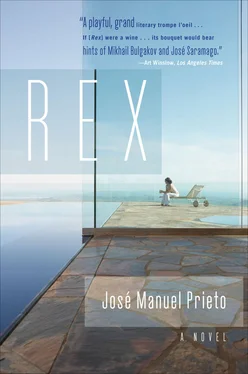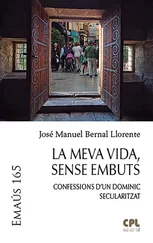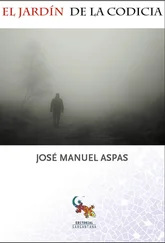Or else — the second reading — I should stay. Divided.
I would watch your mother emerge from the water, stroll through the garden. All her innocence in the way she stood at the gate, warily scrutinizing both sides of the street, then come back toward the house with the spontaneity of Albertine appearing on the Balbec beach, that beautiful passage in the Writer, full of the charm of the group of young girls, each one different from all the others as she comes along the promenade. As if a bird were making its way across the grass, though have you ever seen a bird walk? Nothing clumsier. Not at all like flight.
But your mother was flying across the garden with infinite grace, hair brushing against her shoulders, thighs gleaming beneath the fabric of her dress. A courtesan and a murderess was Nelly — easy to see that in her way of walking, her calves speaking to me, her shoulder blades.
Standing at the window, watching her go by.
Like the peasants the Writer speaks of, their faces pasted to the great window of the hotel dining room in Balbec, gazing inside without giving away their thoughts, their terrible conviction that the bourgeois fish inside that aquarium would look better in a forced labor camp, working spiritedly toward rehabilitation, pushing heavy carts along and calling out to each other by their first names. Furtively observing: this or that fish, this or that form of conduct. Noiselessly sliding open the fish tank’s sluice gates, toward which each swims of its own volition, the eyes of one filled with dreams of women, jewels in another’s. And thus tricked into leaving the aquarium, they’re forced to shovel earth and push carts.
The discovery I made that midday, the day after your father’s arrival, and which changed everything I’d thought until then about the house, the porcelain elephants, the Asiatic luxury. A find whose décor or backdrop was the rainbow the “Japanese” gardener’s sprinklers flung into the air from one end of the garden to the other.
For there was a treasure at the end of that rainbow, one drop twinkling among the blades of grass, immobile as a planet amid a flight of twilight stars. A drop of water artificially enlarged to the size of a garbanzo, though its walls had not collapsed. Blue.
3
This is what I’d been doing: I’d gone up to the boy’s room to teach my class, as I did every day. I would go into the room, I would open the windows wide, I would shout into his ear: “For what purpose? Why so much time, Petya, between these sulfurous walls, these illuminated screens?”
Or was it to your advantage that you’d never read anything? A blank mind, ready to be inculcated with a love of reading, even if it was only a single book? I opened the Book, seeking an explanation there for your stupid fixation on the TV, and also for the other enigma that had been occupying my mind: What made them stay home all the time? Why didn’t they go out, ever? Batyk’s way of checking the locks throughout the house before going to bed, like a shadow, and the dogs, the borzois, brought from Russia expressly for the purpose, always panting at his heels. The wind that blew through the square garden, the low wind that blew in from the coast and enveloped us all there, next to the swimming pool after the boy’s classes were over, and I would be thinking: Well, I’ve worked, I’ve done battle with his obtuse brain, why not go out? Go for a stroll? Go, all of us, down into the Marbella night? (I’d heard the phrase “Marbella night” somewhere; it wouldn’t have occurred to me to call it anything else when I saw the streetlights along the Paseo Marítimo go on, a garland of light along the water.) A discotheque to dance in, a woman, Nelly, your mother, who would, at her age, be the prettiest, the most luminous on the dance floor. But no: they spent hours next to the pool, drinking orangeade, lying in the sunshine without making any move to get up, without saying to each other: Look, it’s getting dark, the heat of the day is past. Put on your green dress, Nelly, why don’t we go to that Portuguese restaurant, that Cambodian place? Yura and Natasha will come along, Juan and Arantxa.
Never.
They had no friends, no one ever called them, no one visited the house. They never went out. Sometimes I cast a look out the classroom window and saw her, your mother, leaning against the gate to peer through the little door at eye level — to catch sight of her husband coming back, I thought, after he left again, two weeks later. But no, because she’d also done the same thing, I’d seen her doing it, when he was there, perhaps studying the cars or people who went by (very few people along those streets, all of them in cars). Only Batyk ventured out, I saw him coming home from the market with loaded bags and sometimes Russian newspapers.
At that point I would go back to the lesson, I would think for a moment, or I would open the Book, cradling its spine in my hand and allowing its pages to fall open heavily, with the same weight as all the pages of the Bible, like a bibliomancer using the Book to prophesy, read the future. And on the morning I’m telling you about, my eye happened to fall on the beautiful passage that speaks of the sea, is full of the blue air of the sea, all its breadth and density reaching up to the sky, where the blue lives, Petya, every other color in the spectrum filtered out.
He fills those pages with a quivering group of girls ( in flower, as the Writer enchantingly describes them), a scene that reveals the life, the promise of a better life, outside, throbbing, moving forward across the whole width of the beach. The Writer’s unique method, writing in slow motion, calm seaside strolls like these, Petya, some day: From the far end of the sea wall, where they formed a singular moving shape, I saw five or six young girls approaching, as different in look and gesture from the people usually seen in Balbec as a band of seagulls disembarked from out of the blue, and executing in measured steps — those left back catching up to the rest in quick bursts of flight — a stroll along the beach, a stroll whose purpose was as obscure to the bathers whom the girls appeared not to see as it was clearly determined in their own avian spirits.
Then I saw it beneath the sprinklers’ fine mist: a drop of dew, an artificially enlarged formation, big as a garbanzo. Blue.
4
I walked all morning toward that flash, making my way through the blades of grass beneath the weight of a terrible suspicion. I reached it laboriously, picked it up, that sparkle, that solidified spot of light between my thumb and index finger. A blue stone, some type of crystal that I examined as I crouched there, which lost its sparkle in my body’s shadow. Which diminished and was absorbed into my feet as I stood up without taking my eyes from the crystal, the sun at its zenith. I moved it then, the stone, turned it slowly to make it emit the sparks I’d noticed from above when I was turning my head and the stone was still, my eyes zeroing in on its blue.
In the garden, lying in the grass. How? Fallen from whose pocket? I knew instantly, as I gained velocity and my proportions diminished, whose pocket. Not from Lifa’s apron, not from the Buryat’s white nylon shirt or appalling gray pants, but from your father’s immense trousers. The night before (a starry night? a starry night) arriving at the house, and once inside, past the wall, throwing down the stones clenched in his fist. Certain now that he hadn’t lost his way back to the house, which he could almost touch, stretching his hands out in front of him like a sleepwalker and heading toward the illuminated living room. But before that, letting the stone drop, his strength gone.
The living room curtains blowing in and out all the while at my back, feeling the curtains there, no need to turn and see them. Should I walk in the opposite direction, through the gate, out into the street, lean back against the wall and study this object that serrated the air around it? Or turn and shout, “A diamond! Here in the grass!”? The air lapping at my pants, the sea breeze (or it came from inland, I don’t know) blowing at my back, the light touch of a god, the zephyr. To understand it, assent to it: “All right, but, how? Flee? Run away because of a diamond in the rough? Because of an uncut diamond in the grass?”
Читать дальше












